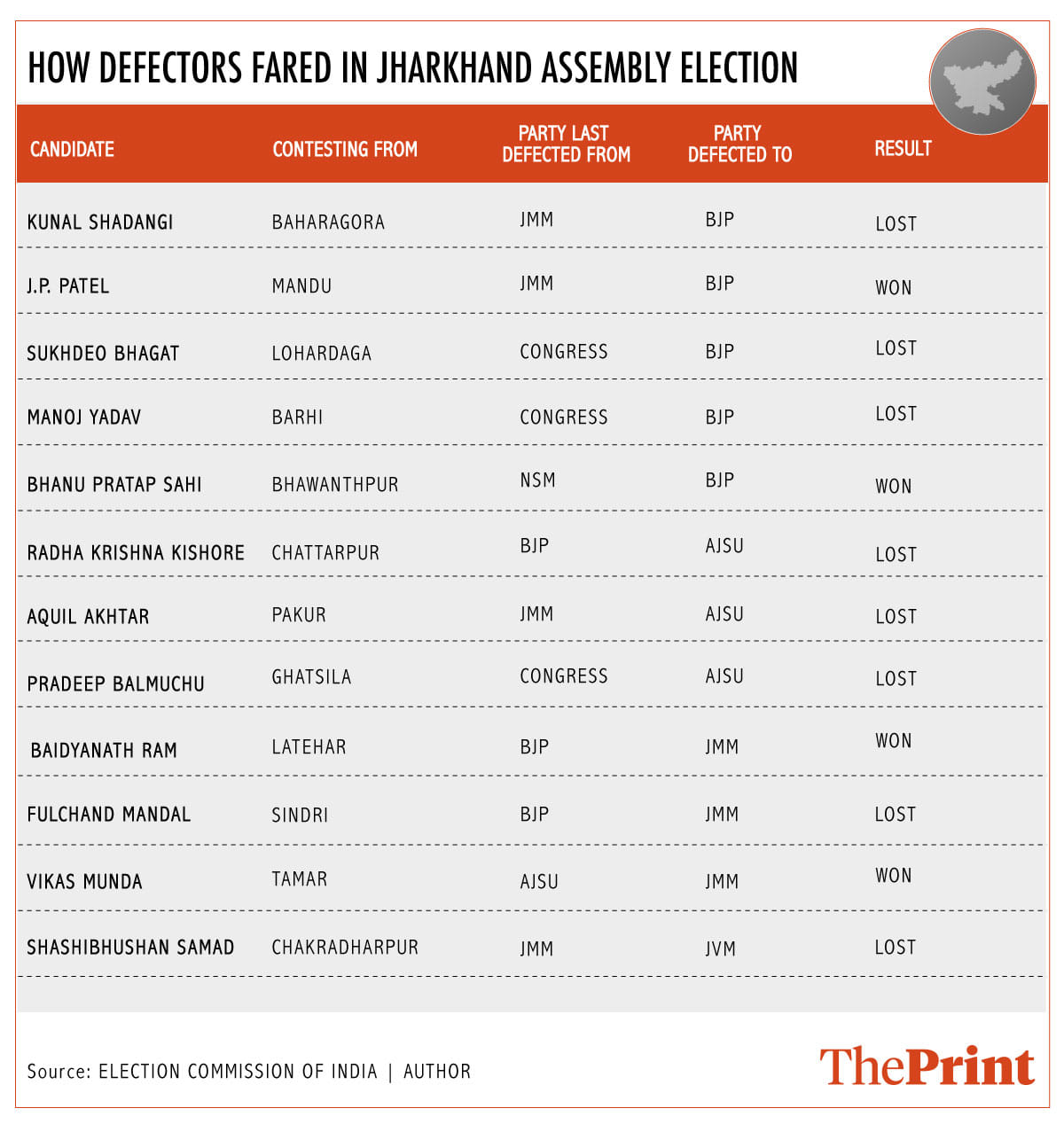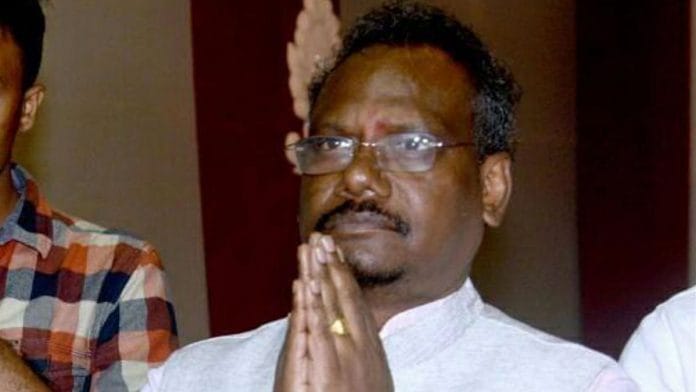New Delhi: The Jharkhand election results seem to have given a message to the turncoats — if you want to switch your loyalty to another party, do it much before the elections. The chances of rejection are quite high otherwise.
The Jharkhand verdict, which came out Monday, show most of the candidates who switched sides just before the elections have lost.
Take the example of Kunal Shadangi from Baharagora. He left the Jharkhand Mukti Morcha (JMM) just before the elections to join the BJP, but the voters rejected him. Shadangi lost by over 60,000 votes to JMM’s Samir Kumar Mohanty.
Similarly, Sukhdeo Bhagat joined the BJP from the Congress days before the elections and lost from Lohardaga. Bhagat, who won 25.37 per cent of the vote, lost to Congress’ Rameshwar Oraon, who scored 42.67 per cent.
Another candidate from Chakradharpur, Shashibhushan Samad, who quit the JMM and joined Babulal Marandi’s Jharkhand Vikas Morcha (Prajatantrik) before the elections, lost to JMM’s Sukhram Oraon by over 26,000 votes.
BJP’s Manoj Yadav, who lost from Barhi, had also changed sides from the Congress, before the elections.
Similarly, former Jharkhand Congress president and three-term MLA Pradeep Kumar Balmuchu, who had joined the All Jharkhand Students Union (AJSU), lost from Ghatshila.
A senior BJP leader pinned the blame on outgoing Chief Minister Raghubar Das, who kept everyone out of the ticket distribution process.
“We were kept out of the ticket distribution process. Everything was done by the chief minister. Voters are well-versed with politics and they understand that those who switch sides days before elections can’t be trusted,” said the leader, who didn’t wish to be named.
There were, however, a few candidates, who won despite changing sides before the polls. BJP’s Jai Prakash Bhai Patel, who defected from the JMM, won from Mandu by a little more than 2,000 votes.

Also read: How Hemant Soren turned JMM’s fortunes after 2 poll routs in Jharkhand
Old turncoats won
The election results showed that candidates who changed loyalties much before the elections went on to win from their seats.
Four JVM(P) candidates — Naveen Jaiswal (Hatia), Amar Kumar Bauri (Chandankiyari), Alok Kumar Chourasia (Daltonganj), Ranjit Singh (Sarath) — had quit the party in 2015 to join the BJP. All of them won in this election.
On Monday, Jharkhand became the third state, after Maharashtra and Haryana, in a span of a few months to throw up an embarrassing result for the Bharatiya Janata Party.
In Maharashtra and Haryana too, the turncoats had to see rejection by the voters.
The BJP won 25 seats in the 81-member Jharkhand assembly, while the JMM-Congress-RJD alliance got 47 seats, way ahead of the majority mark.
Also read: Modi lost Jharkhand because his priorities have changed – from vikas purush to Hindu saviour







1. Citizen-voters know that political parties’ basic objective is first to win election at any cost, then to seize power and then to retain it somehow. BJP, and every other political party, is guilty of making all sorts of compromises to retain power. 2. Hence, it is rather naive to talk of ideology today, irrespective of which party’s government or which alliance government is voted to power. 3. As we follow system of First Past the Post in deciding a winning candidate in elections, what is often observed is that a candidate securing just about 25 to 30 % votes can be a winner. Even after assuming that as many as 80% voters in a constituency have cast their votes, votes secured by a winning candidate can be as less as 20% of total votes in a constituency. Thus elections become a farce. My point is that holding elections alone won’t solve citizen-voters’ problems. We must implement election law reforms to reduce scope for use of black money and to ensure that a winning candidate represents a majority.
Karnataka is the only state which voted for turncoats in recent times.
Ultimately, in any election, the will of the people prevails. This is not to discount the many Machiavellian things that are done before – sometimes also after – the voting, but these work only up to a point. Consider how Uttar Pradesh is being governed. Does anyone honestly believe Yogiji will storm back to power two years from now.
Abhijit Iyer Mitra, Senior fellow, Institute of Peace and Conflict Studies, claims that Adityanath has been able to successfully override anti-incumbency wave in UP. If true, how did that happened? Also, the communists were “storming” back to power in West Bengal election after election, until they were booted out by Mamata Banerjee. How was that happening? They were in power for 34 years without an interruption.